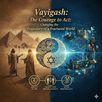Ways to Avoid Spoiling the Ones we Love
- Rabbi Yosef Vogel

- Feb 2, 2024
- 2 min read

Sometimes in life, we have good intentions, but the outcome is not always good. A common example of this is being overly generous in an unhelpful way.
The relationship between parents and children is a topic that everyone can relate to. Parents are interested in what is best for their children. Consequently, their home is filled with love and security, and they provide their children with modern material comforts, a good education, and some financial support according to their resources.
This all appears to be straightforward. So why do things go wrong so often?
Clearly, the relationship between parents and children is the most complex. Indeed, according to Sigmund Freud, adult development was largely determined by the relationships that children have with their parents.
There is a component in this relationship, like most others, that is both fundamental and most challenging. The reason for this is that it goes against our human nature, especially as parents.
Inherently, we all love our children. Without a doubt, it is the most powerful form of natural love we know. However, there is a problem that comes with this. It is often because of our profound love for our children that we are no longer able to make a clear judgment about what is truly in their best interest.
This week's Torah portion provides a good illustration of this. Prior to the revelation at Mount Sinai, we read about an intriguing dialogue between Moses and his father-in-law Jethro.
Upon observing Moses' efforts to provide counsel in resolving disputes between the Jewish people, Jethro challenged his son-in-law by asking, 'Why do you act alone?' “The thing you are doing is not right.” (Exodus 18:14-17)
The Rebbe explains that Moses desired what he believed was best for the people he loved dearly. He had a desire to be the sole provider of their spiritual growth and development. He was unwilling to give this responsibility to someone else who was less knowledgeable or invested.
Jethro, however, challenges and eventually convinces Moses that this premise is not healthy or sustainable in the long term. Firstly, human beings want and need to earn what they have. A person prefers one measure of their own produce to nine measures of another's produce. (Bava Metzia 38:1).
Secondly, if we don't allow our children to navigate their lives independently, we are denying them the ability to fully mature and realize their true potential, enabling them to become self-sufficient.
The greatest gift that we can give our children is the ability to care for themselves and achieve dignified independence, which is crucial for their growth and happiness.
Yosef Vogel




Comments